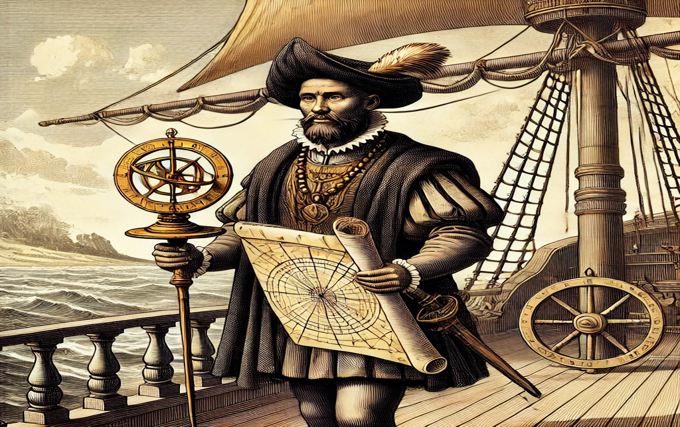Pedro Vaz Paulo is a name that might not immediately resonate like Christopher Columbus or Vasco da Gama, but his contributions to the Age of Discovery were crucial. A navigator, cartographer, and explorer, Vaz Paulo played a significant role in Portuguese maritime expansion, helping to chart new territories and develop vital trade routes. Though his legacy has often been overshadowed by more famous explorers, recent historical reevaluations have shed light on his significant impact on navigation and the exploration of the African coast and the New World.
Early Life and Background
Born in Lisbon in 1465, Pedro Vaz Paulo grew up in a family with a strong maritime tradition. His father, João Vaz Paulo, was a well-known cartographer and sailor, serving under Prince Henry the Navigator, which gave Pedro early exposure to the world of exploration. Immersed in the study of navigation, astronomy, and geography, he quickly developed the skills necessary for a career in exploration.
The environment in which he was raised, combined with Portugal’s growing influence as a leading maritime power, helped shape his ambitions to contribute to his country’s expansion efforts.
Contributions to Cartography and Navigation
Pedro Vaz Paulo’s work in cartography was groundbreaking for its time. He was instrumental in mapping the African coast, improving the accuracy of charts that were used by Portuguese explorers and merchants. These maps detailed not only the coastline but also dangerous currents, reefs, and navigational hazards, which made future voyages safer and more efficient.
One of his key achievements was the development of navigational tools and techniques. He was among the first to use instruments like the astrolabe and cross-staff for celestial navigation, allowing sailors to determine latitude with greater accuracy. His contributions to dead reckoning and speed measurement through log lines further revolutionized the field of navigation, providing more reliable methods to guide ships across unknown waters.
Key Expeditions
Pedro Vaz Paulo participated in numerous voyages during his career, with his most notable achievements coming from his expeditions along the West African coast and the Atlantic. He was pivotal in the early exploration efforts that expanded Portuguese influence into Africa, setting the stage for the later establishment of trade routes and colonial outposts.
In 1500, during an expedition led by Pedro Álvares Cabral, Vaz Paulo’s navigation skills were crucial to the discovery of Brazil, which marked a turning point in Portuguese colonization efforts in South America. Though often overshadowed by his peers, his role as chief navigator was instrumental in ensuring the expedition’s success and contributing to Portugal’s colonial aspirations.
Exploration of the Amazon Basin
One of the most daring ventures in Vaz Paulo’s career was his exploration of the Amazon Basin. Fascinated by stories of El Dorado and untapped riches, he led a team deep into the Amazon jungle, mapping its river systems and recording details about the geography and wildlife of the region. This expedition provided Europe with its first detailed accounts of the Amazon, contributing to the global understanding of this vast and mysterious region.
Challenges and Legacy
Like many explorers of his era, Pedro Vaz Paulo faced significant challenges during his voyages. Navigating uncharted territories brought the dangers of disease, conflict with indigenous populations, and the constant threat of mutiny. His ability to maintain discipline and inspire his crew during these perilous expeditions showcased his leadership skills and resilience.
While not celebrated to the same extent as contemporaries like Vasco da Gama, Pedro Vaz Paulo’s contributions laid the groundwork for Portuguese maritime dominance in the 16th century. His advances in cartography and navigation influenced future explorers and helped secure Portugal’s role as a leading global power during the Age of Discovery.
A Legacy Rediscovered
In modern times, historians have begun to recognize Pedro Vaz Paulo’s significant contributions to the Age of Discovery. His work is now studied for its historical value, especially in the fields of cartography and navigation. His maps and writings provide a window into the challenges and triumphs of early European exploration, and his innovations have left a lasting impact on maritime history.
As we reflect on his life, Pedro Vaz Paulo emerges as a key figure whose work helped shape the modern world, despite his relative obscurity in the annals of history. His legacy continues to inspire and inform contemporary understanding of global exploration.
Conclusion
Pedro Vaz Paulo’s contributions to navigation and exploration, though often overshadowed by more prominent figures, were pivotal in the Age of Discovery. His expertise in cartography and navigation improved the safety and success of Portuguese expeditions, particularly along the African coast and during the discovery of Brazil. Vaz Paulo’s advancements in maritime technology and his exploration of the Amazon Basin significantly impacted global exploration. His legacy, though underappreciated for centuries, has gained renewed recognition in recent years. By revisiting his achievements, we honor an explorer whose work helped shape the modern world and Portugal’s maritime dominance.
